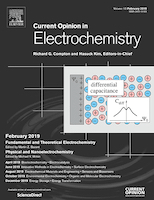
Current Opinion in Electrochemistry
Scope & Guideline
Advancing Insights in Analytical Chemistry and Electrochemistry
Introduction
Aims and Scopes
- Electrocatalysis and Energy Conversion:
Research focused on the development and optimization of electrocatalysts for energy conversion processes, including fuel cells, water splitting, and CO2 reduction. - Electrochemical Sensors and Biosensors:
Exploration of novel electrochemical sensors and biosensors for environmental monitoring, medical diagnostics, and biochemistry, emphasizing sensitivity, selectivity, and real-time analysis. - Materials Science and Engineering:
Investigation into the design and characterization of new materials for electrochemical applications, including nanostructured materials, hybrid systems, and advanced electrode architectures. - Electrochemical Processes in Environmental Applications:
Studies addressing the use of electrochemical technologies for wastewater treatment, resource recovery, and pollution remediation, highlighting sustainable practices. - Theoretical and Computational Electrochemistry:
Development of theoretical models and simulations to understand electrochemical mechanisms, kinetics, and interface phenomena, contributing to the rational design of electrochemical systems. - Innovative Techniques in Electrochemistry:
Adoption of advanced techniques such as in situ spectroscopy, electrochemical microscopy, and machine learning for enhanced understanding and control of electrochemical processes.
Trending and Emerging
- Machine Learning in Electrochemistry:
The integration of machine learning techniques into electrochemical research is on the rise, facilitating data analysis, predictive modeling, and the design of new materials. - Sustainable and Green Chemistry:
A growing emphasis on sustainable practices within electrochemistry, including the development of environmentally friendly processes for energy conversion and waste treatment. - Electrochemical CO2 Conversion:
Research focusing on the electrochemical reduction of CO2 into valuable products is gaining traction as a critical area for addressing climate change and energy sustainability. - Advanced Electrode Materials:
Innovations in electrode materials, particularly those that enhance performance under various operating conditions, are increasingly prominent in the literature. - Bioelectrochemistry and Biocatalysis:
The exploration of bioelectrochemical systems and biocatalysts for energy production and environmental applications is becoming a significant area of focus, bridging biology with electrochemical technology. - Electrochemical Imaging Techniques:
Emerging methods for visualizing electrochemical processes at the nanoscale are gaining popularity, allowing for a deeper understanding of reaction mechanisms and material behaviors.
Declining or Waning
- Traditional Electrochemistry:
Research focusing on classical electrochemical methods and techniques has seen a decline as newer, more sophisticated methods such as in situ and operando techniques gain traction. - Noble Metal Catalysts:
There has been a noticeable decrease in studies centered on noble metal catalysts as researchers increasingly explore earth-abundant and non-precious metal alternatives for sustainability. - Basic Electrochemical Theory:
Theoretical discussions on fundamental electrochemical principles appear to be less prominent, overshadowed by applied research and practical applications in advancing technology. - Single-Use Electrochemical Devices:
Interest in single-use or disposable electrochemical devices has declined in favor of more sustainable and reusable systems, reflecting a shift towards environmental considerations. - Electrochemical Energy Storage Systems:
While still relevant, traditional studies on energy storage systems like lead-acid batteries are being replaced by research on next-generation technologies such as lithium-sulfur and solid-state batteries.
Similar Journals

Journal of the Korean Electrochemical Society
Fostering Excellence in Electrochemical Research and ApplicationsJournal of the Korean Electrochemical Society (ISSN: 1229-1935, E-ISSN: 1229-1935) stands as a prominent publication in the rapidly evolving field of electrochemistry. Published by the prestigious Korean Electrochemical Society, this journal serves as a vital platform for researchers, professionals, and students eager to disseminate and access cutting-edge studies related to electrochemical processes, materials, and technologies. With an emphasis on promoting innovative research and practical applications, the journal aims to foster collaboration and knowledge exchange within the global electrochemistry community. Although not an open access journal, it provides comprehensive and rigorous peer-reviewed content that ensures the highest scientific quality, making it a valuable resource for anyone involved in the field. Located in Seoul, South Korea, it continues to contribute significantly to the advancement of electrochemical sciences, addressing key challenges and developments that shape the future of technology and environmental sustainability.

Applied Chemistry for Engineering
Advancing Knowledge for Real-World ApplicationsApplied Chemistry for Engineering, published by the Korean Society of Industrial and Engineering Chemistry, is a vital resource for researchers and professionals engaged in the realms of chemical engineering and applied chemistry. With an ISSN of 1225-0112 and an E-ISSN of 1228-4505, this journal serves as a platform for innovative research that spans diverse applications within these fields. Although currently not classified under open access, it provides critical insights and advancements to its audience, contributing to the ongoing discourse in the industry. The journal's significance is underscored by its rankings in Scopus, where it resides in the Q4 category for both Chemical Engineering and Chemistry, evidencing its commitment to publishing relevant studies despite its emerging status. As it continues to grow through the converged years from 2007 to 2024, Applied Chemistry for Engineering aims to bridge the gap between theoretical research and practical engineering solutions, making it an essential tool for students, researchers, and professionals alike.

RUSSIAN JOURNAL OF ELECTROCHEMISTRY
Pioneering Discoveries in ElectrochemistryThe Russian Journal of Electrochemistry, published by Pleiades Publishing Inc, is a reputable scientific resource that caters to the dynamic field of electrochemistry. Since its inception in 1996, this journal has become a platform for the dissemination of cutting-edge research, exploring both foundational studies and innovative applications within electrochemical science. Despite currently holding a Q4 categorization in its field, the journal is dedicated to enhancing its scholarly impact and visibility, reflecting its commitment to fostering advancements in electrochemical technologies. With its ISSN 1023-1935 and E-ISSN 1608-3342, the journal strives to reach a global audience of researchers, professionals, and students alike. Though the journal is not open access, its contents are crucial for anyone looking to stay at the forefront of electrochemical research and developments. The journal's editorial board includes well-respected experts, ensuring that published articles contribute significantly to the scientific community and pave the way for future innovations in the field.
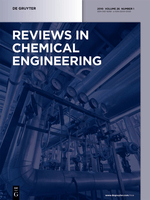
REVIEWS IN CHEMICAL ENGINEERING
Fostering Interdisciplinary Collaboration and Innovation.REVIEWS IN CHEMICAL ENGINEERING, published by Walter de Gruyter GmbH, is a premier journal that delivers cutting-edge insights and comprehensive reviews in the field of chemical engineering. Established as an eminent resource since 1982, this journal is committed to advancing knowledge and fostering innovation in various domains of chemical engineering, including process design, materials, and environmental considerations. With an impressive Q1 ranking in the 2023 Scopus category for Chemical Engineering and a commendable 20th position out of 273 journals, it is recognized for its rigorous peer-review process and high-impact contributions. Although it operates under a subscription model, the journal remains a vital platform for researchers and professionals aiming to stay at the forefront of technological advancements and scholarly discourse in chemical engineering. With a focus on interdisciplinary applications and real-world relevance, REVIEWS IN CHEMICAL ENGINEERING is an indispensable resource for academics, industry professionals, and students dedicated to excellence in this field.
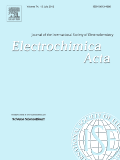
ELECTROCHIMICA ACTA
Pioneering Research in Electrochemistry and Chemical EngineeringELECTROCHIMICA ACTA is a prestigious academic journal dedicated to the field of electrochemistry and chemical engineering. Published by PERGAMON-ELSEVIER SCIENCE LTD, this journal stands out with its impressive impact factor and is categorized in the top quartile (Q1) for both Chemical Engineering and Electrochemistry in 2023, further cementing its role as a leading venue for cutting-edge research. With a publication history dating back to 1959 and converging into 2024, it has established a substantial archive of influential articles that explore various aspects of electrochemical processes, materials, and applications. Researchers and professionals in the field benefit from the journal’s high visibility, as it ranks remarkably well according to Scopus metrics, with a position in the 90th percentile for General Chemical Engineering and 84th percentile for Electrochemistry. Although ELECTROCHIMICA ACTA does not currently offer open access, it continues to serve as a vital resource for those seeking to expand their knowledge and explore innovative developments in electrochemical science.
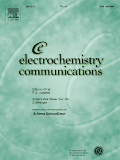
ELECTROCHEMISTRY COMMUNICATIONS
Empowering Researchers with Cutting-Edge Electrochemical KnowledgeELECTROCHEMISTRY COMMUNICATIONS, published by ELSEVIER SCIENCE INC, is a leading journal in the field of electrochemistry, holding a prestigious position in the Q1 quartile since 2023. With an impact factor reflecting its esteemed reputation, the journal ranks #15 out of 60 in the Scopus Chemistry category for Electrochemistry, placing it in the 75th percentile. Since adopting an Open Access model in 2019, it has garnered widespread visibility and accessibility, enabling researchers and professionals to share groundbreaking findings and foster innovation. Covering a wide range of topics from fundamental electrochemical research to practical applications, ELECTROCHEMISTRY COMMUNICATIONS serves as a critical platform for disseminating knowledge and advancing the field. The journal's commitment to quality and relevance positions it as a vital resource for academics and practitioners striving to stay at the forefront of electrochemical science.

ACTA CHIMICA SINICA
Connecting Researchers through Cutting-edge Chemical StudiesACTA CHIMICA SINICA, published by SCIENCE PRESS, is a distinguished peer-reviewed journal in the realm of Chemistry, specifically focusing on general and miscellaneous chemistry fields. Since its inception in 1982, the journal has consistently contributed to the advancement of chemical research in China and beyond, maintaining a reputable standing within the academic community, evidenced by its 2023 Scopus ranking of #197 out of 408 in its category. With a current impact factor placing it in the Q3 quartile, ACTA CHIMICA SINICA aims to disseminate innovative research findings, covering a wide spectrum of topics within the discipline. Although it is not an open-access journal, it offers various access options through institutional subscriptions, ensuring that its high-quality content is available to a broad audience. Researchers, professionals, and students alike will find this journal a vital resource for keeping abreast of developments in the field and for contributing their own findings to an engaged scientific community.

Electrocatalysis
Exploring the Dynamics of Electrochemical Systems.Electrocatalysis, published by SPRINGER, is a leading journal dedicated to advancing the field of electrochemistry, providing a comprehensive platform for the dissemination of cutting-edge research and innovative methodologies from 2010 to 2024. With an ISSN of 1868-2529 and an E-ISSN of 1868-5994, this journal has established a reputable presence, ranking in the Q3 category of the electrochemistry segment as of 2023 and positioning itself within the 29th out of 60 in the Scopus classification. The journal welcomes submissions that explore a wide array of topics involving electrocatalysts, their applications, mechanisms, and advancements, aiming to catalyze the understanding of electrochemical systems and foster interdisciplinary collaborations. Although the journal is not openly accessible, it remains a vital resource for researchers, professionals, and students seeking to stay abreast of the latest findings and theoretical developments in this dynamic field.
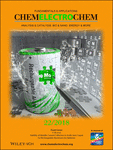
ChemElectroChem
Unlocking innovative solutions for a sustainable future.ChemElectroChem is a premier open-access journal published by WILEY-V C H VERLAG GMBH, focusing on the interdisciplinary fields of catalysis and electrochemistry. Established in 2014 and actively publishing until 2024, this journal boasts an impressive reputation, currently ranked in the Q2 category for both catalysis and electrochemistry according to the 2023 metrics. With an Scopus ranking placing it in the 74th percentile for Electrochemistry and 61st for Chemical Engineering and Catalysis, ChemElectroChem serves as an essential platform for researchers, professionals, and students dedicated to advancing knowledge and fostering innovation in these critical scientific domains. Since its transition to open access in 2023, the journal aims to maximize the dissemination of cutting-edge research and facilitate the exchange of ideas among global scholars, thereby enhancing the accessibility and impact of high-quality science within the community. For those engaged in the ever-evolving conversations around energy storage, conversion processes, and sustainable solutions, ChemElectroChem is an invaluable resource.

Nanosystems-Physics Chemistry Mathematics
Exploring Innovative Research in Condensed Matter PhysicsNanosystems-Physics Chemistry Mathematics is a prominent academic journal dedicated to advancing knowledge in the interdisciplinary fields of condensed matter physics, materials science, and mathematics. Published by the St. Petersburg National Research University of Information Technologies, Mechanics, and Optics, this journal plays a crucial role in disseminating valuable research findings and theoretical developments from 2019 to 2024. With an evolving scope that reflects the latest trends and methodologies, the journal strives to connect researchers, professionals, and students with groundbreaking discoveries and applications in nanotechnology and related areas. Although it currently holds a Q4 rating in Condensed Matter Physics and ranks within the Q3 tier in several categories, its commitment to promoting open dialogue and innovative solutions highlights its potential for growth and impact. Researchers can access various formats to ensure the accessibility of knowledge, further enriching the academic community's engagement with cutting-edge scientific developments.